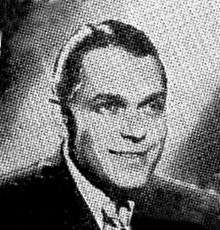Frankie Masters
Frankie Masters (April 12, 1904 – October 28, 1990) was a big band leader whose performance career spanned the late 1920s to late 1970s.
Frankie Masters | |
|---|---|
 Frankie Masters in a 1944 advertisement | |
| Background information | |
| Born | April 12, 1904 U.S. |
| Died | October 28, 1990 (aged 86) Barrington, Illinois, U.S. |
| Genres | Jazz |
| Occupation(s) | Musician, bandleader |
| Instruments | Guitar |
| Years active | 1920s – 1970s |
| Labels | Victor, Vocalion |
Career
Masters graduated from Robinson High School in southern Illinois. He attended Indiana University, where he led a band that performed at college dances. During the summer, he found work as a guitarist with the orchestra on the cruise ship S.S. President Madison as it headed for Asia. When he returned, he joined a big band led by Benny Krueger at the Tivoli Theatre in Chicago.[1]
He signed with Victor Records in 1927 and began his recording career but didn't achieve much success until he switched to Vocalion Records in 1939 and recorded what would become his theme song, "Scatterbrain," a number one hit that year.
MCA organized a sponsored radio show for the Masters band in about 1939. It was broadcast first via WBBM, later WMAQ and was called It Can Be Done.[2] Also featured each week was poet-journalist Edgar Guest. The show, according to saxophonist Buddy Shaw, who played with Masters's band at the time, featured stories about people who achieved success through adversity. Masters and company also made several movie shorts, which were shown in theaters nationally.
He and his wife, singer Pyllis Miles, hosted the television show Lucky Letters on WBKB.[1] Later that year and into early 1951, they had a weekly program called Walgreen's Open House.
Then in the fall of 1974, when the Empire Room of the Palmer House reopened for the season, the Frankie Masters Orchestra became the new house band, replacing Ben Arden and his band, which had been appearing there since 1957.
References
- Heise, Kenan (31 October 1990). "Frankie Masters, 86". tribunedigital-chicagotribune. Retrieved 1 September 2017.
- "Frankie Masters—From 1920's Chicago Cabarets and Everything in Between" (PDF). Archived from the original (PDF) on 2016-03-04. Retrieved 2012-05-10.